John Janaro's Blog, page 247
October 1, 2015
The "Sheer Suffering" of Therese
October begins with Saint Therese, who died of tuberculosis on September 30, 1897. She was only 24 years old. In her final days, several of her sisters recorded her words.
She once said, "Take heart, Jesus hears even the last echo of our pain."

She once said, "Take heart, Jesus hears even the last echo of our pain."

Published on October 01, 2015 20:13
September 30, 2015
The Risk of Being Vulnerable

So I have presented in two parts the text of Young JJ's "State of the World Address" from September 1990. I have reflected a bit on how Old JJ might talk about the "State of Now" September 2015. It seems a bit overwhelming at this point in my life to issue manifestos like this.
The theme of power, however, is one that I return to often enough in my own reflections. "Power and responsibility" is perhaps one of the defining challenges of the emerging epoch. There is much to say about it, but let me see if I can make a start:
"How can we shape the use of our vast technological power so that it serves the good of the human person, families, communities, society, the environment entrusted to us? I see this question everywhere. Of course we need Jesus, but He will not give us cheap answers. He deepens the question in us, because in Him human persons and all of creation become more dear to us, and we become more "vulnerable" to their suffering. He calls us to live in that vulnerability -- to take the risks of loving those entrusted to us in our lives, those whose needs and anguish cry out to us. He even calls us to seek them out, accompany them, suffer with them, while placing all our hope in Him."
. . . .
Wait. Stop. Hold it!
That sounds good in words. But honestly, I don't understand what I'm talking about. Or perhaps there is a very small, very fragile place inside me that has begun to understand a little bit. A really, really tiny little bit.
But who am I kidding? I don't really "live love." I live an aesthetic appreciation of the idea of love. Okay, maybe there is a little love in me, but it's nearly always mixed together with self-admiration and fakery. Ah yes, "the ambivalence" of human beings. "Man is an insoluble dilemma to himself," says Young JJ.
Twenty five years later, Old JJ says, "I am ambivalent. I am an insoluble dilemma to myself! "
Am I willing to become more vulnerable, more tender toward others, more honest (really), more willing to "take the risks of loving...?" Risks? Seriously, me take risks? RUN! HIDE!
Dear friends, I am terrified of taking risks. I am afraid to love.
Yes, friends, I am afraid of you.
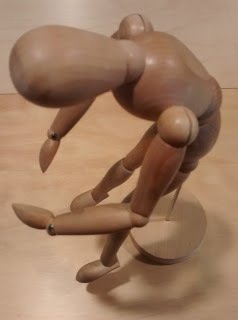 And so I'm always hiding from you: hiding behind my intelligence, hiding behind humor, hiding behind my illnesses, hiding behind a thousand fibs, hiding behind sentimentality, hiding behind my reputation, hiding behind my writing, hiding and protecting places in myself even as I try to have real empathy and share my life with you.
And so I'm always hiding from you: hiding behind my intelligence, hiding behind humor, hiding behind my illnesses, hiding behind a thousand fibs, hiding behind sentimentality, hiding behind my reputation, hiding behind my writing, hiding and protecting places in myself even as I try to have real empathy and share my life with you.I'm so sorry. I wish so much to be more, to be courageous, to be honest. I wish with an aching desire but I remain in this bottle of fear. I'm so sorry, friends. I'm struggling and trying, I think, but sometimes it comes out so awkwardly. Forgive me.
Eileen, kids, Mom, Dad, Walter... I'm afraid.... I'm sorry. Forgive me. I'm a poor human being. Poor in love.
So what, then, is this "very small, very fragile place," this "really, really tiny little bit" of understanding and desire in me?
Theologian JJ would like to intervene here and say, "That is God's work in you; the work of His grace. That is the hope that is beginning to transform you, the place from which you pray, the light of His love that leads you and in which you see the faces of others."
But Old JJ replies, "Why, then, is it so small?" Why, O God, is it so small?
And no one has any more words. There are already far too many words.
What I have is silence. And solitude. Sometimes it feels like loneliness, but underneath all of that there is the solitude. And there is the wanting that burns and burns and burns, and bursts through beyond all that I know.
Published on September 30, 2015 17:46
September 29, 2015
The World of 25 Years Ago, Part II
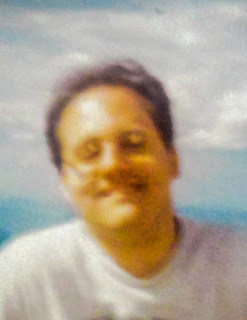 Before the month comes to a close I should finish posting the "Statement" that young John Janaro wrote in September of 1990 as he began a journal that would cover the next two years of his life and times. (See HERE for the first part.)
Before the month comes to a close I should finish posting the "Statement" that young John Janaro wrote in September of 1990 as he began a journal that would cover the next two years of his life and times. (See HERE for the first part.)I began by speaking of how we human beings, even as we developed our power for accomplishing great good, always seemed to find ourselves using that power for greater evils. The tension at the heart of the profound ambiguity of human existence was growing greater.
Twenty five years later, that tension has pushed even further. It has grown exponentially, and in many ways that we could not have imagined in 1990.
If I were writing such a broad survey of the times today, however, I would do it differently. I would write more from the perspective of my own suffering and also my own gratitude. I would place my own weakness and my need for healing more in the center. I would write perhaps in a less sophisticated way.
In any case, this is what I wrote a quarter of a century ago. It is a recognizable theme that I still ponder: the problem of human beings living without God. But I believe now (more than I did before) that God still draws us on His mysterious paths by the often-hidden workings of His grace -- even in our ignorance and incoherence and failure and in the apparent insignificance of our lives.
Even if we try to live without God, He still dwells with us. He has made His dwelling among us and He is not going away.
God wants to empower us to build up the good in this world, but first and above all, He wants us. He made us not only for this world, but also to share His eternal life.
And He is Love.
He knows our weakness and our selfishness, and that we play with own spectacular (and often dangerous) toys without even thinking about the reason why we exist. He sees our poverty and loneliness in the midst of all our riches, and it cannot be any other way because He has placed His signature on each or our hearts. Our hearts will always be greater than our power, and so "it's never enough" and yet we don't know where to go.
God knows we are a mess. But He hasn't given up on us, and He wants to meet us with His compassion.
I still see the problems of human existence but my perspective has grown, and what are "my words" below have become more my life and my suffering. In strength and in weakness, I am more aware that what matters is fidelity to the Mystery of God and His opening-up of my life to my brothers and sisters, in love.
For the record, then, let us listen to the Young Janaro of September 1990 . Maybe he was smarter than I am today. He was learning and thinking about many things, and then -- as now -- he was so much in need of mercy.
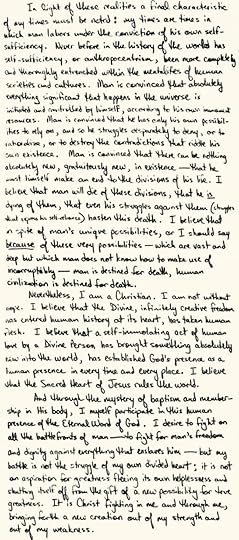
Published on September 29, 2015 20:30
September 28, 2015
Brain Disorders and Brain Health
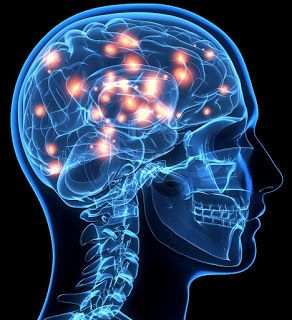 In my book Never Give Up I talk about a range of illnesses which are beginning to be classified as neurobiological disorders--these are "mental illnesses" that are rooted (in at least some respect) in chemical imbalances in the brain or the failure of the brain to carry out properly its delicate and complex operations.
In my book Never Give Up I talk about a range of illnesses which are beginning to be classified as neurobiological disorders--these are "mental illnesses" that are rooted (in at least some respect) in chemical imbalances in the brain or the failure of the brain to carry out properly its delicate and complex operations.We know that neurological disorders can cause people to have chronic "tics" or muscle spasms. Well, it appears that on a more subtle and "invisible" level the same kind of disturbances in brain functioning can cause "mental spasms"--quirks, repetitions, or distortions in the imaging, impressive, and expressive activity of the brain that accompanies our thinking.
Thinking is fundamentally spiritual, but in the human being who is a mysterious union of soul and body it is something that is done in conjunction with (and is therefore affected by) physiological processes. We all know that drinking alcoholic beverages affects the brain and thereby inclines us to perceive things differently and even to "think" differently. Surely it is possible that all kinds of circumstances that we do not yet understand may affect (and afflict) the brain in more subtle ways. These circumstances may even be rooted in genetic factors, which seems to be the case in more obvious, visible disorders.
Certainly all this has become something of a fad in some sectors of the psychiatric field. These kind of problems are overdiagnosed. They are also overmedicated, or many of the medicines made for them are clumsy and ineffective. Having said that, it must be admitted that the great achievement of modern clinical psychiatric medicine has been the discovery of the neurological aspect of many mental illnesses.
Moreover, advanced brain imaging technology is confirming the clinical evidence. We are just beginning to learn the need for careful and attentive medical care for the most important and mysterious organ in our body, the brain.
We have learned that the brain can't be ignored. Psychological therapy has many values, but it won't help a person's liver or kidneys to heal. The brain is also an organic reality. It too requires physiological attention and assistance when necessary.
"Talk treatment" cannot cure a person with Tourette's Syndrome. Now we also know that it won't cure the underlying condition of a person with Obsessive Compulsive Disorder. The same thing can be said for many (though not all) types of depression, anxiety disorders, and that increasingly expanding category of complex conditions called "bi-polar" disorder.
Psychotherapy has its place in facilitating healing in the realm of human experience. It is not irrelevant by any means to neurobiological disorders. It can help build habits of "brain hygiene," help construct and maintain a healthy environment for brain functioning, and address the life damage that comes as a consequence of these complex brain disorders. Certain types of therapy may even help stimulate healing processes within the brain itself. But what we know for certain is that in these situations the brain, as a physiological entity, also needs medical help.
At the same time, we are learning that the brain can't simply be nuked with medications that are designed to counteract artificially its chemical or functional imbalances. "Brain medicine" is a delicate art of integrative health care, and here it is especially clear that it is impossible to be effective without treating the patient as a whole, i.e. as a human person.
It is also worth mentioning here the advances being made in the treatment of brain injuries, e.g. "concussions." If anything good has come out of the recent wars (though, tragically, not good for those who have had to endure them), it is the advancement in the understanding of brain injuries, how they can occur, what permanent damage they may cause, and how they may be related to conditions such as Post Traumatic Stress Disorder. Having suffered and recovered from a major concussion in a car accident in 2005, my personal hunch is that "minor" brain injuries--perhaps even on the internal level--probably happen much more frequently than any of us realize.
The brain is, truly, a remarkable, resilient and durable instrument, for all its complexity and delicacy. I believe there are vast possibilities for healing the brain and supporting the overall health of the brain. We are only beginning to discover them.
Published on September 28, 2015 20:18
September 27, 2015
Mercy Beyond Our Sight
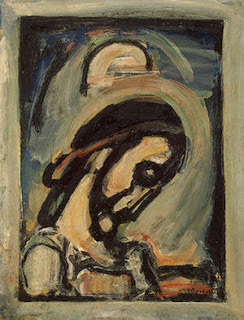 Georges Rouault, Crown of ThornsMental illness is so complicated and so difficult for people to perceive even within themselves, because it afflicts the organic components that are involved with the great human capacities of knowledge, judgment, and freedom. These afflictions touch upon the way we regard ourselves and present ourselves to others.
Georges Rouault, Crown of ThornsMental illness is so complicated and so difficult for people to perceive even within themselves, because it afflicts the organic components that are involved with the great human capacities of knowledge, judgment, and freedom. These afflictions touch upon the way we regard ourselves and present ourselves to others.For this reason, they can be especially destructive. I know this only too well. I know how much my own life has been drawn back from the edge, how often my survival has been a "close call."
I also know -- and still weep for -- people I have loved who didn't survive, whose lives were shattered beyond our sight and beyond this world. Their loss leaves a wound in me, and in others, that will last as long as our journey through this present age.
These wounds will remain open, but their affliction is ultimately made of love, and of a raw hope that the mercy of God really is beyond anything we can imagine or conceive.
Published on September 27, 2015 20:43
September 26, 2015
This Strange Loneliness: How am I Called to Respond?
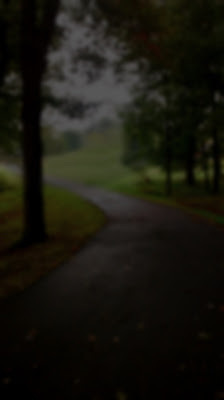 The world can look dim and dark and fading. Why?We live in a world of unimaginable suffering of body, mind, and soul. So much suffering and desperation.
The world can look dim and dark and fading. Why?We live in a world of unimaginable suffering of body, mind, and soul. So much suffering and desperation.We are all united, all called to a common destiny, all objects of His ineffable but utterly faithful love and mercy. God is faithful, even though so many know only a darkness. So many are broken and shattered and alone, lost, confused, unaware of their own dignity as persons created by God and for God.
So many are weakened and wounded by sicknesses of all kinds.
Affliction spreads by the crushing weight of material poverty. It also spreads by the relentless, unforgiving, monstrous lust for power that drives our "rich" society, that pressures people to "succeed" by manipulating instruments of power and casts aside those who can't hang on.
Cast aside.
If you live in this culture and have a genetic predisposition for depression or some other mental illness, it's probably going to be triggered.
Because ours is a society of trauma and interior wounds that fester and weaken and cripple human beings.
I know these people are suffering. I hear their cries inside of my own suffering. I hear their desperation and their sense of being lost and worthless. Of being alone.
I know that I'm not alone. How blessed I am!
Sometimes I am wounded by loneliness nevertheless. It's part of the disease. It's pain. But that is not all, because I am still a person.
Do I not still have freedom in front of this pain? How am I called to respond? I know that in this strange loneliness I am linked, somehow, to the loneliness of all these other human beings, my brothers and sisters.
I hear their overwhelming cries. So much loneliness!
I can't bear that any person should be alone in this way.
But I'm afraid of my brothers and sisters in anguish. I am a weak human being. Weak because of affliction, yes, but also weak in freedom, weak in love. I'm a selfish man. Selfish! But this pain, our pain, keeps cutting my heart.
I don't know what to do. I offer, I pray, I believe and trust and hope for them and for myself.
They suffer in darkness.
I don't know how to reach them in this darkness, to help us all to find healing for our wounds.
More than thirty years of studying theology. It has given me many things. I don't regret it. It has enabled me to help people, and to teach and write about certain things. It has humbled me, because after all of it I know so little....
I do not know how I, myself, here and now, can reach out to the brokenhearted and accompany them in their search for healing. Their experiences will teach me more about myself, and I am afraid of what I might learn.
How are we all to discover that we are loved by God? Not in a sentimental way, not as a comforting phrase, not as just theology or a pastoral program... but really.
How are we to know that we are really loved by God? Now! In a way that is greater than our pains and that carries a promise....
Dear God, we need this. I need this. Jesus.
Break down the walls of fear.
Published on September 26, 2015 10:09
September 25, 2015
Mister Francis Goes to Washington
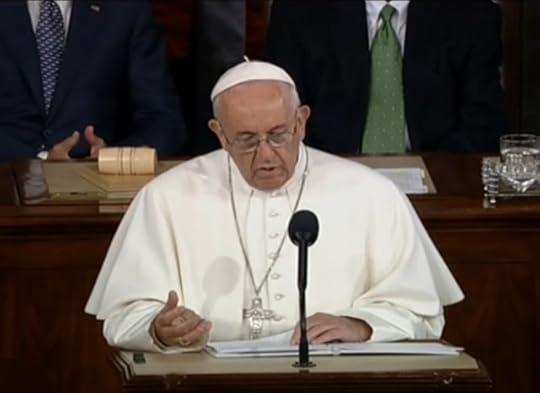 Pope Francis addresses a joint session of the United States Congress. It was a historic moment, and he rose to the occasion with his challenging address. In the corridors of power, he spoke to the heart.
Pope Francis addresses a joint session of the United States Congress. It was a historic moment, and he rose to the occasion with his challenging address. In the corridors of power, he spoke to the heart.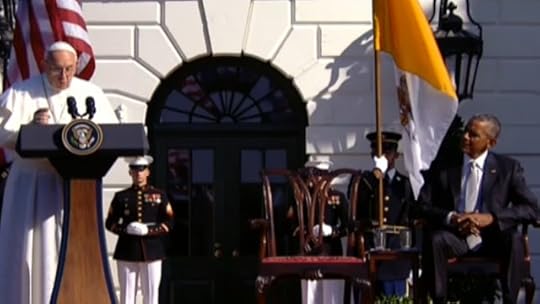 "Pope and Emperor," twenty first century style. The Pope came to remind the Emperor of his responsibilities as a leader of human beings. Did the Emperor listen? Let us never underestimate the grace of God.
"Pope and Emperor," twenty first century style. The Pope came to remind the Emperor of his responsibilities as a leader of human beings. Did the Emperor listen? Let us never underestimate the grace of God.
Published on September 25, 2015 20:19
September 23, 2015
"Java Tonic"
Today was the first day of Autumn 2015.
We have been greeted by foggy mornings, and I have had the brains to go with them. But my go-to medicine for brain freeze can take care of that.
Well, most of it.... Enough for me to design and generate a silly graphic. There's nothing like the revitalizing wonders of "Java Tonic"!

We have been greeted by foggy mornings, and I have had the brains to go with them. But my go-to medicine for brain freeze can take care of that.
Well, most of it.... Enough for me to design and generate a silly graphic. There's nothing like the revitalizing wonders of "Java Tonic"!

Published on September 23, 2015 20:43
September 22, 2015
Pilgrimage of Love
Pope Francis is in the United States of America from September 22-27.
Welcome to the USA, Holy Father! Thank you for coming to our country. Our love and our prayers are with you!
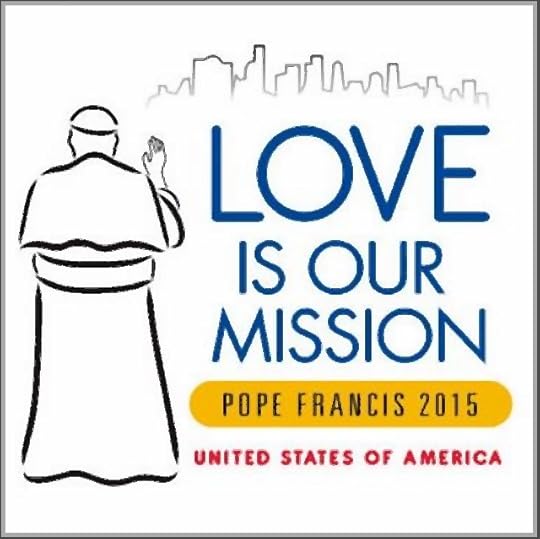
Pope Francis gives remarks in English on the White House lawn:
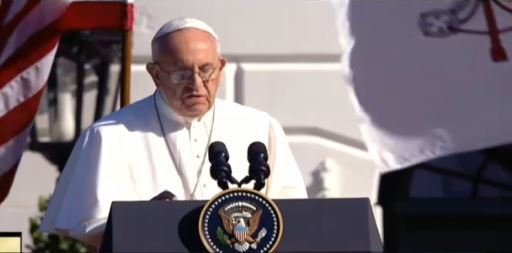
Welcome to the USA, Holy Father! Thank you for coming to our country. Our love and our prayers are with you!

Pope Francis gives remarks in English on the White House lawn:

Published on September 22, 2015 20:59
September 20, 2015
Always a Gift
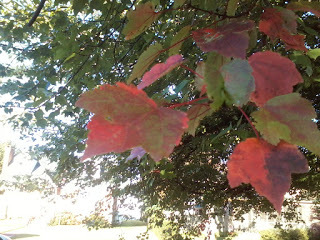 The older I get, the more I'm learning not only to survive and to cope, but actually to find some incomprehensible, entirely peculiar physical and psychological "balance" where I can really live within the limits of my health condition and its consequences.
The older I get, the more I'm learning not only to survive and to cope, but actually to find some incomprehensible, entirely peculiar physical and psychological "balance" where I can really live within the limits of my health condition and its consequences.I'm blessed by so much. There is so much to see, so much that is positive and good and worth living for right now.
Hindrances do give us the chance to focus with greater attention on what is in front of us. I'm starting to see that.
Not that I'm looking for any further hindrances, obstacles, or chances to suffer. I'm not ready for anything like martyrdom, or the concentration camp, or even broken air conditioning!
But I'm beginning (always, every day, beginning... again) to trust in God that there is a way to "handle" and live constructively what I'm called to face here and now.
Reality is always a gift.
It takes time to see that, however, so I need to be patient and pray and trust (even when I'm physically and mentally freaking out). Then the way begins to open up, enough to take the next step.
Published on September 20, 2015 20:16



